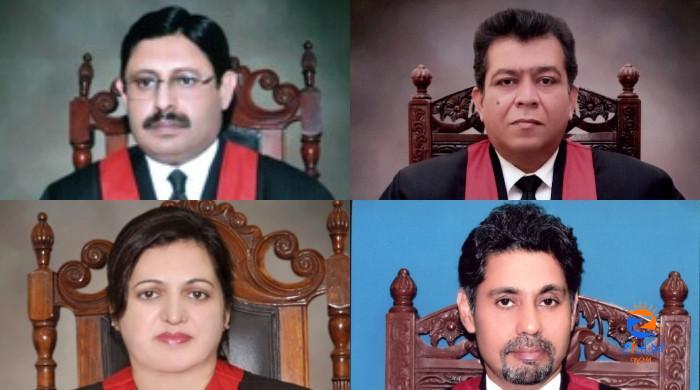
[ad_1]
LAHORE: A day after several Islamabad High Court (IHC) judges received anthrax-laced letters, four Lahore High Court (LHC) judges received threatening letters, said the registrar’s office on Wednesday.
The high court judges who received the letters are Justice Shujaat Ali Khan, Justice Shahid Bilal Hasan, Justice Alia Neelum and Justice Abid Aziz Sheikh.
Meanwhile, the three judges who initially received the threatening letter are the members of the administrative body.
Officials of the counter-terrorism department (CTD) reached the high court’s building while security has also been tightened.
Additionally, a forensic team has also reached the court to examine the suspicious letters. The CCTV cameras placed around the high court are also being checked.
A day earlier, sources told Geo News eight judges of the Islamabad High Court (IHC) including its Chief Justice Aamer Farooq received “suspected anthrax-laced letters”.
A police team comprising experts launched a thorough probe to collect facts and ascertain powdery substance after the eight IHC judges received “suspicious letters containing suspected anthrax powder along with a threatening message”.
The letter was sent by a woman namely Resham without mentioning her address, the sources said.
They added that a staffer of a judge accidentally dropped the envelope containing the suspicious powdery substance and later he felt extreme irritation in eyes and burns on skin around his lips.
The threatening letters to high court judges come after the Supreme Court took suo motu notice and formed a seven-member bench led by Chief Justice of Pakistan Qazi Faez Isa to hear the matter after the six IHC judges blamed spy agencies for meddling in judicial affairs.
Apart from the CJP, the bench also comprises Justice Syed Mansoor Ali Shah, Justice Yahya Afridi, Justice Athar Minallah, Justice Mussarat Hilali, Justice Jamal Khan Mandokhail and Justice Naeem Akhtar Afghan.
The explosive letter which surfaced last week triggered a crisis and the Supreme Court led by CJP Isa was under pressure to hear the matter under Article 184(3) of the Constitution.
[ad_2]
_updates.jpg)